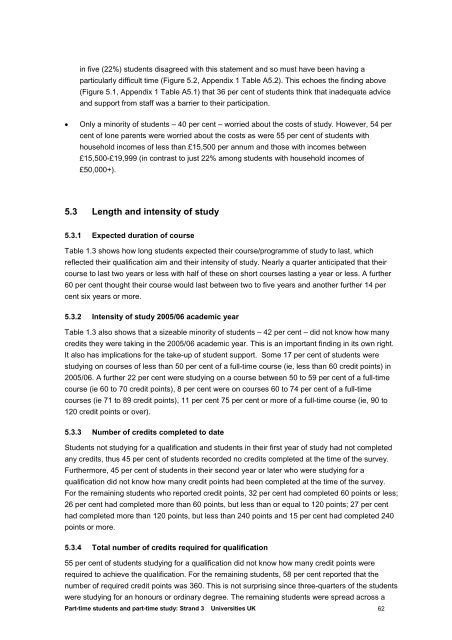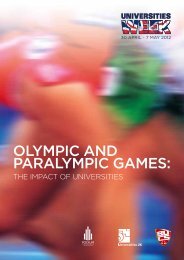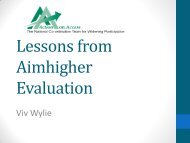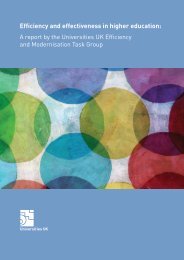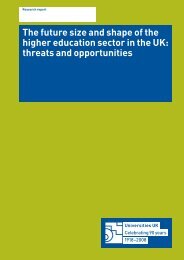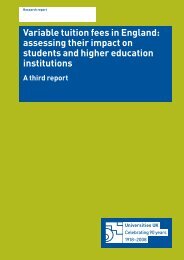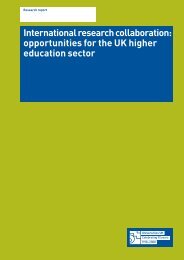Part-time Students And part-time Study In Higher ... - Universities UK
Part-time Students And part-time Study In Higher ... - Universities UK
Part-time Students And part-time Study In Higher ... - Universities UK
You also want an ePaper? Increase the reach of your titles
YUMPU automatically turns print PDFs into web optimized ePapers that Google loves.
in five (22%) students disagreed with this statement and so must have been having a<strong>part</strong>icularly difficult <strong>time</strong> (Figure 5.2, Appendix 1 Table A5.2). This echoes the finding above(Figure 5.1, Appendix 1 Table A5.1) that 36 per cent of students think that inadequate adviceand support from staff was a barrier to their <strong>part</strong>icipation.• Only a minority of students – 40 per cent – worried about the costs of study. However, 54 percent of lone parents were worried about the costs as were 55 per cent of students withhousehold incomes of less than £15,500 per annum and those with incomes between£15,500-£19,999 (in contrast to just 22% among students with household incomes of£50,000+).5.3 Length and intensity of study5.3.1 Expected duration of courseTable 1.3 shows how long students expected their course/programme of study to last, whichreflected their qualification aim and their intensity of study. Nearly a quarter anticipated that theircourse to last two years or less with half of these on short courses lasting a year or less. A further60 per cent thought their course would last between two to five years and another further 14 percent six years or more.5.3.2 <strong>In</strong>tensity of study 2005/06 academic yearTable 1.3 also shows that a sizeable minority of students – 42 per cent – did not know how manycredits they were taking in the 2005/06 academic year. This is an important finding in its own right.It also has implications for the take-up of student support. Some 17 per cent of students werestudying on courses of less than 50 per cent of a full-<strong>time</strong> course (ie, less than 60 credit points) in2005/06. A further 22 per cent were studying on a course between 50 to 59 per cent of a full-<strong>time</strong>course (ie 60 to 70 credit points), 8 per cent were on courses 60 to 74 per cent of a full-<strong>time</strong>courses (ie 71 to 89 credit points), 11 per cent 75 per cent or more of a full-<strong>time</strong> course (ie, 90 to120 credit points or over).5.3.3 Number of credits completed to date<strong>Students</strong> not studying for a qualification and students in their first year of study had not completedany credits, thus 45 per cent of students recorded no credits completed at the <strong>time</strong> of the survey.Furthermore, 45 per cent of students in their second year or later who were studying for aqualification did not know how many credit points had been completed at the <strong>time</strong> of the survey.For the remaining students who reported credit points, 32 per cent had completed 60 points or less;26 per cent had completed more than 60 points, but less than or equal to 120 points; 27 per centhad completed more than 120 points, but less than 240 points and 15 per cent had completed 240points or more.5.3.4 Total number of credits required for qualification55 per cent of students studying for a qualification did not know how many credit points wererequired to achieve the qualification. For the remaining students, 58 per cent reported that thenumber of required credit points was 360. This is not surprising since three-quarters of the studentswere studying for an honours or ordinary degree. The remaining students were spread across a<strong>Part</strong>-<strong>time</strong> students and <strong>part</strong>-<strong>time</strong> study: Strand 3 <strong>Universities</strong> <strong>UK</strong> 62


